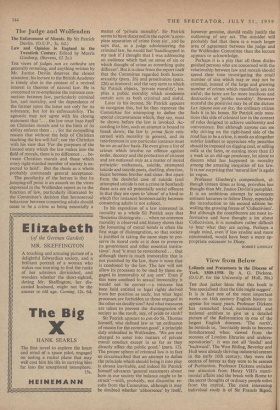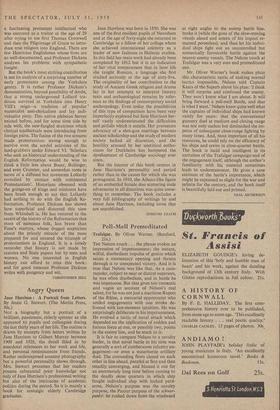View from Below
Lollards and Protestants In the Diocese of York. 1509-1558. By A. G. Dickens. (O.U.P. for the University of Hull, 30s.) THE dust jacket hints that this book is 'less specialised than the title might suggest'. It is in fact one of the most important works on 16th century English history to appear for many years. Professor Dickens has ransacked local, ecclesiastical and national archives to give us a detailed picture of the Reformation in one of the largest English dioceses. 'The north', he reminds us, 'inevitably tends to become foreshortened when viewed from the recesses of London libraries and archive- repositories': it was not all 'feudal' and 'backward'. The West Riding, Beverley and Hull were already thriving industrial centres in the early 16th century; they were the centres of heresy as they were to be centres of Puritanism. Professor Dickens switches our attention from Henry VIII's matri- monial affairs and the break with Rome to the secret thoughts of ordinary people miles from the capital. The most interesting individual study is of Sir Francis Bigod,
a fascinating protestant intellectual who was executed as a traitor at the age of 29 after trying to use. first Thomas Cromwell and then the Pilgrimage of Grace to intro- duce true religion into England. There are few Henrician Englishmen whose lives are so well-documented, and Professor Dickens analyses his problems with sympathetic insight.
But the book's most striking contribution is not its analysis of a surprising number of early protestants among the Yorkshire gentry. It is rather Professor Dickens's demonstration, beyond possibility of doubt, that a strong underground Lollard tra- dition survived in Yorkshire into Henry VIII's reign—a tradition of popular • materialist anti-clericalism and lay indi- vidualist piety. This native plebeian heresy existed before, and for some time side by side with, the new-fangled doctrines which clerical intellectuals were introducing from foreign parts. The fusion of the two streams made protestantism strong enough to survive even the sordid activities of the land-grabbers under Edward VI. 'Scholars who seek an historical understanding of the English Reformation would be wise to think a little less about Bucer, Bullinger, and even Cranmer, and somewhat more in terms of a diffused but inveterate Lollardy revivified by contact with continental Protestantism'. Historians obsessed with the goings-on of kings and ministers have been brash enough to say that Lollardy had nothing to do with the English Re- formation. Professor Dickens has shown how superficial and distorted this view from Whitehall is. He has restored to the centre of the history of the Reformation that mass of nameless folk, less brave than Foxe's martyrs, whose dogged scepticism about the priestly miracle of the mass prepared for and ensured the triumph of protestantism in England. It is a timely reminder that history is not made by statutes and State papers but by men and women. No one interested in English history can afford to miss this book: and for good measure Professor Dickens writes with pungency and wit.
CHRISTOPHER HILL































 Previous page
Previous page